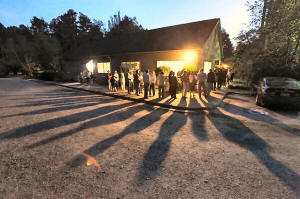|
Polling safeguards stepped up after
Trump's 'rigged election' claim
 Send a link to a friend
Send a link to a friend
 [October 22, 2016]
By Sharon Bernstein and Rory Carroll [October 22, 2016]
By Sharon Bernstein and Rory Carroll
(Reuters) - Authorities in Philadelphia
will station prosecutors throughout the city on election day to respond
to any reports of voter intimidation or other illegal activity after
Republican presidential nominee Donald Trump claimed that polling might
be "rigged" in this mostly minority city.
Philadelphia is one of many U.S. municipalities wrestling with how to
respond to Trump's call for supporters to "watch" polling places, and
corresponding promises from civil rights groups that they will send
their own backers to the polls.
"All of our election judges will be provided with cell phones that have
direct access to the district attorney's office of Philadelphia," said
Tim Dowling, chief deputy to City Commissioner Lisa Deeley. "As soon as
you cross the line, you're going to be dealing with law enforcement."
The Nov. 8 presidential election has been among the most contentious in
the nation's history. Trump, whose campaign has been shaken by
allegations that he groped numerous women after a video surfaced in
which he made lewd comments about groping women, has refused to promise
that he will accept the results of the election if he loses to Democrat
Hillary Clinton.
This week, Trump told supporters to "watch" polling places in such
cities as Philadelphia, St. Louis and Chicago - all with large minority
populations. As Trump has slipped in the polls, he has repeatedly said
the election is "rigged" against him.

Fearing that to be true, voters in Denver have been calling officials
seeking reassurance, said Amber McReynolds, the city's director of
elections.
"Voters will call in and say, 'Is the election rigged?' McReynolds said.
"We try to explain how the process works. ... Rigging an election is
pretty much impossible."
Various election experts, including Republicans, have said that it is
virtually impossible to rig a presidential election, and numerous
studies have shown that voter fraud in U.S. elections is very rare.
In Arizona, a traditionally Republican state where polls have recently
begun to show an increase in support for Clinton, poll workers are being
trained to deal with an expected onslaught of observers, said Elizabeth
Bartholomew, spokeswoman for elections officials in Maricopa County,
where Phoenix is located.
In North Carolina, where a local Republican party headquarters was badly
damaged on Sunday in an unsolved arson attack, state elections officials
are taking extra steps to address poll security.
On Wednesday, the state elections board’s executive director, Kim
Strach, sent county elections officials a memo outlining examples of
prohibited behavior at polling places and emphasizing that state and
federals laws bar intimidation and coercion at the polls.
[to top of second column] |

Voters cast shadows as they wait in a line at a polling station open
into the evening as early voting for the 2016 general elections
begins in Durham, North Carolina, U.S., October 20, 2016.
REUTERS/Jonathan Drake

In Philadelphia, teams from the district attorney's office will be
stationed throughout the city, ready to respond at a moment's
notice, Dowling said. The city is also increasing security at
polling places, demanding for the first time identification even
from credentialed poll-watchers sent by political parties.
The city has activated such teams in previous elections, but this
year there are more, and they will be set up at police stations.
"Because of all the rhetoric, we’re erring on the side of caution,"
Dowling said.
Despite the high-profile nature of the claims, fears about
intimidation at polling places may be overblown. Some of Trump's
supporters have distanced themselves from his remarks about watching
the polls.
Many jurisdictions allow poll watchers, but they generally have to
be credentialed and their numbers are limited. Several elections
officials said they had so far not received an unusually high number
of requests for poll-watcher credentials.
In Leon County, Florida, for example, where the state capital of
Tallahassee is located, 55 people affiliated with the Democratic
Party had registered as poll watchers to observe early voting, which
begins Monday. Two had signed up on behalf of Trump, and none for
the Republican Party, Ion Sancho, supervisor of elections for the
county.
"We don't believe there will be any problems at the polls," he said.
Florida civil rights activist Becca Guerra said she is not worried
about voter intimidation inside polling places because of rules on
electioneering and on poll watchers, but voters may have trouble
outside in the parking lot.

"We are training our folks to be the eyes and ears," she said.
(Reporting by Sharon Bernstein in Sacramento, Calif., and Rory
Carroll in San Francisco; Additional reporting by Colleen Jenkins,
Letitia Stein and Andy Sullivan; Writing by Sharon Bernstein;
Editing by Leslie Adler)
[© 2016 Thomson Reuters. All rights
reserved.]
Copyright 2016 Reuters. All rights reserved. This material may not be published,
broadcast, rewritten or redistributed. |